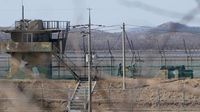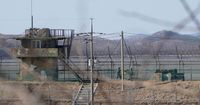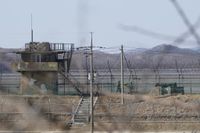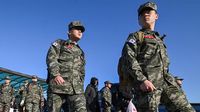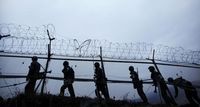On April 8, 2025, South Korea's military fired warning shots after approximately ten North Korean soldiers crossed the heavily fortified border separating the two countries. This incident occurred around 5 p.m. local time in the eastern section of the Demilitarized Zone (DMZ), a region notorious for its tensions and military presence. According to South Korean officials, the North Korean troops quickly retreated back across the Military Demarcation Line following loudspeaker warnings and a volley of gunfire.
The South Korean military reported that some of the North Korean soldiers were armed and wearing bulletproof vests during the crossing. Despite the potential for escalation, no injuries were reported, and the situation did not escalate into a major confrontation. The Joint Chiefs of Staff of South Korea stated that they are "closely monitoring the North Korean military's activity" in light of this incident.
The DMZ stretches 155 miles long and 2.5 miles wide, making it one of the most fortified borders globally, laden with barbed wire, landmines, and combat troops on both sides. An estimated two million landmines are scattered throughout the area, a remnant of the Korean War that took place from 1950 to 1953, which ended with an armistice rather than a peace treaty.
Interestingly, this incident is not isolated. Similar border violations have occurred in the past, including a notable event in June 2024, where a larger group of North Korean soldiers crossed the border, prompting warning shots from South Korea. At that time, the South Korean military concluded that the North Korean soldiers were carrying construction tools and did not deliberately provoke a confrontation.
The motive behind the recent crossing remains unclear. Some reports suggest that the soldiers may have unintentionally crossed into South Korean territory while conducting patrols ahead of planned frontline works. South Korean media speculated that the soldiers could have been testing reaction times or inadvertently breaching the boundary due to the challenging terrain.
As tensions on the Korean Peninsula remain high, North Korean leader Kim Jong-un has continued to assert his country's military capabilities while fostering closer ties with Russia. Recently, he has sent thousands of troops to support Russia's ongoing conflict in Ukraine. Meanwhile, diplomatic efforts from the United States, particularly from President Donald Trump, to engage with North Korea have been met with silence from Pyongyang, which accuses the U.S. of intensifying hostile policies.
This incident also comes at a time of political instability in South Korea. The country is navigating the fallout from the recent removal of former President Yoon Suk-yeol, who was ousted after declaring martial law in response to mass protests against his administration. The constitutional court's ruling to remove him from office has created a leadership vacuum, further complicating the security situation on the peninsula.
In light of these developments, South Korea's military remains on high alert. They have reiterated their commitment to responding swiftly to any provocations from the North. A spokesperson for the Joint Chiefs of Staff stated, "We are closely observing the North's military status and taking necessary measures to plan our strategy." This vigilance is critical given the volatile nature of the relationship between the two Koreas.
The international community is watching closely, as the dynamics in the region continue to shift. Observers note that the ongoing tensions may lead to further provocations, especially with North Korea's military activities and its alignment with Russia. The DMZ remains a focal point for potential conflict, and any miscalculations could have severe consequences.
As South Korea prepares for upcoming elections in June, the political landscape may influence how the government addresses its northern neighbor. With the recent political upheaval and the ongoing military posturing from North Korea, the situation remains precarious.
In summary, the recent border crossing by North Korean soldiers highlights the ongoing tensions and complexities of inter-Korean relations. While the immediate situation was resolved without violence, the underlying issues remain unresolved, and the potential for future incidents continues to loom large over the Korean Peninsula.
